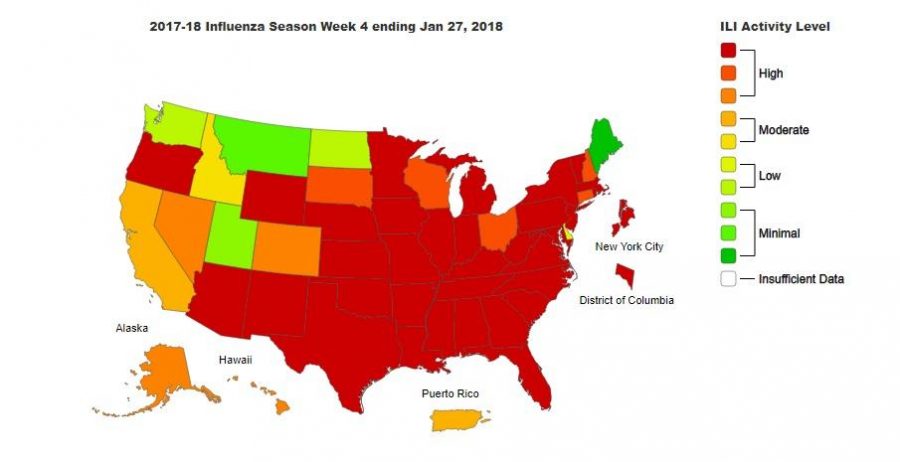Maria M. Silva, Staff Writer
The winter flu epidemic has arrived, and it’s not welcome.
There has now been 10 confirmed cases of the flu at Utica College this semester, an increase by three compared to last semester’s totals, according to the Student Wellness Center.
“This season has started earlier as opposed to last year,” said Dawn M. DeGironimo, staff nurse for the Student Wellness Center. “Last year’s flu season didn’t peak until February, however, this year’s season peaked at the end of December.”
The reason why the number of flu infections have increased is due to the disease’s peak last December.
“Most students were on campus, so that’s definitely a factor of rapid spreading,” DeGironimo said.
In order to determine the effects of the seasonal flu on the population, the Centers for Disease Control conduct a study on Influenza-Like Illness. In addition, the New York State Department of Health (NYSDOH) collects and analyzes information about the flu’s activity, as well as publishing a weekly report during the months in which the illness is at its peak, October to May.
The data that the NYSDOH collected during the week of Jan. 27 revealed that the flu has been geographically “widespread” across the state, adding that it is the eighth consecutive week in which the illness has been reported widespread with 11,683 laboratory-confirmed influenza infections.
Like most common flu-like symptoms, it is easy to confuse influenza with a regular cold. DeGironimo said that during this season’s flu most people complain about symptoms like high fever, body ache, chills and a sore throat.
“With a regular cold, you usually have a runny nose, a cough, and it starts gradually,” DeGironimo said. “However, the flu manifests itself very abruptly, and generally within five days you feel good one day, and the next day you don’t feel so well.”
She added that vomiting is not always associated with the flu and usually affects younger populations. The disease can become more dangerous for those affected with an underlying medical condition, such as diabetes or high blood pressure. However, DeGironimo noted that it is hard to say a healthy person may die from the flu because it’s a rare event, but it can happen.
“Children and the elderly are more susceptible to the flu and definitely have higher numbers of death in case of infection, but that’s just how their immune systems are,” she said.
Prevention is key to avoid getting the flu, DeGironimo said. To avoid catching it, the best protection is getting a flu vaccine, as well as staying away from people who are sick. Washing your hands frequently and keeping a proper hygiene is also key.
If a person starts to feel like they have flu symptoms, then they should see a physician within 72 hours so they can be prescribed Tamiflu. However, after 72 hours, the only option is treating the symptoms, DeGironemo said.
“It is important to rest, notifying the professors and not going to class in order to prevent spreading the germs,” she said.
For some students, this flu season has been tough.
Senior Grace Nibigira got the flu last semester, and it developed with a sore throat, headache, heavy coughing, vomiting and continuous sneezing. It lasted two weeks, although the flu symptoms had decreased, she continued to cough.
Yasser Machat, an exchange student from Tunisia, was also affected with the flu this semester and has had it for the past two weeks. His symptoms have been very similar to Nibigira’s, with continuous coughing, a small fever and even loss of his voice.
Junior Chris Deguilla is among the lucky ones being that he has yet to catch the flu this school year. When thinking about the best treatment for the flu, the three students agreed that the flu vaccine is the best way to prevent falling ill.
“It’s important to stay hygienic and avoid anyone who has the flu,” Nibigira said. “Staying physically active, eating healthy and getting enough sleep is a good way to treat the flu.”
Deguilla follows Nibigira’s steps in order to avoid catching the flu, but also noted that it is important to not touch your face with your hands, as well as to cover your mouth when sneezing or coughing.
Machat has gained some experience in dealing with the flu during the past two weeks.
“Most helpful options are taking a rest, drinking hot stuff, seeing a doctor for prescriptions and wearing warm clothes,” he said.


















![President Todd Pfannestiel poses with Jeremy Thurston chairperson Board of Trustees [left] and former chairperson Robert Brvenik [right] after accepting the university's institutional charter.](https://uticatangerine.com/wp-content/uploads/2023/10/unnamed.jpeg)


















































































































